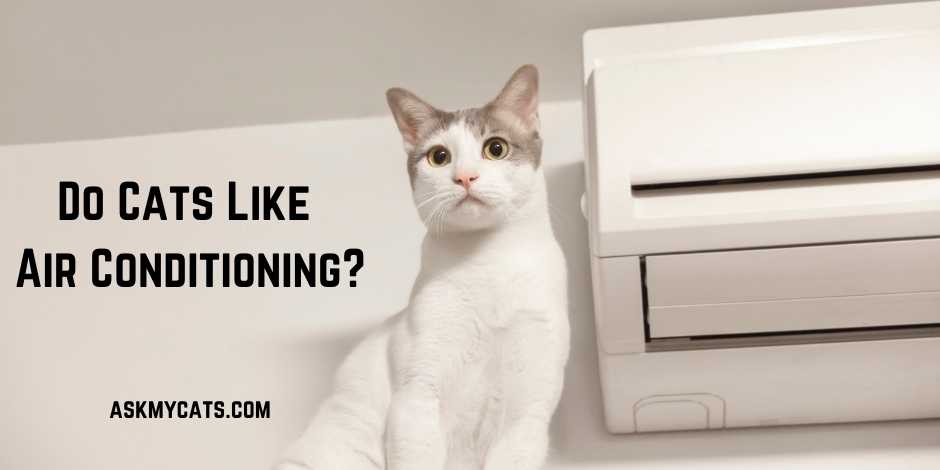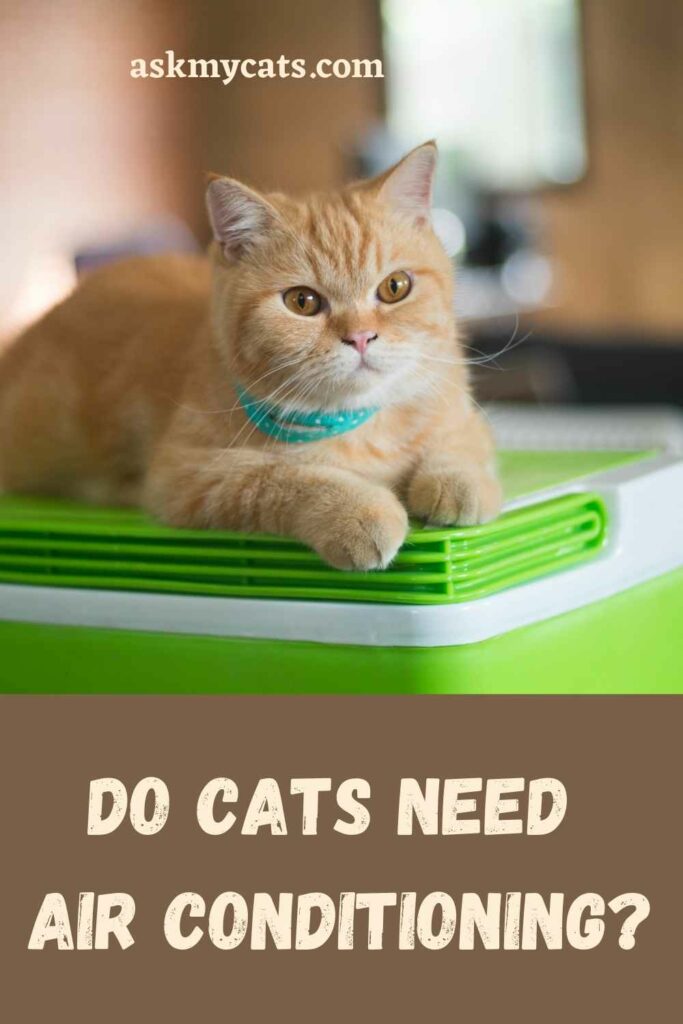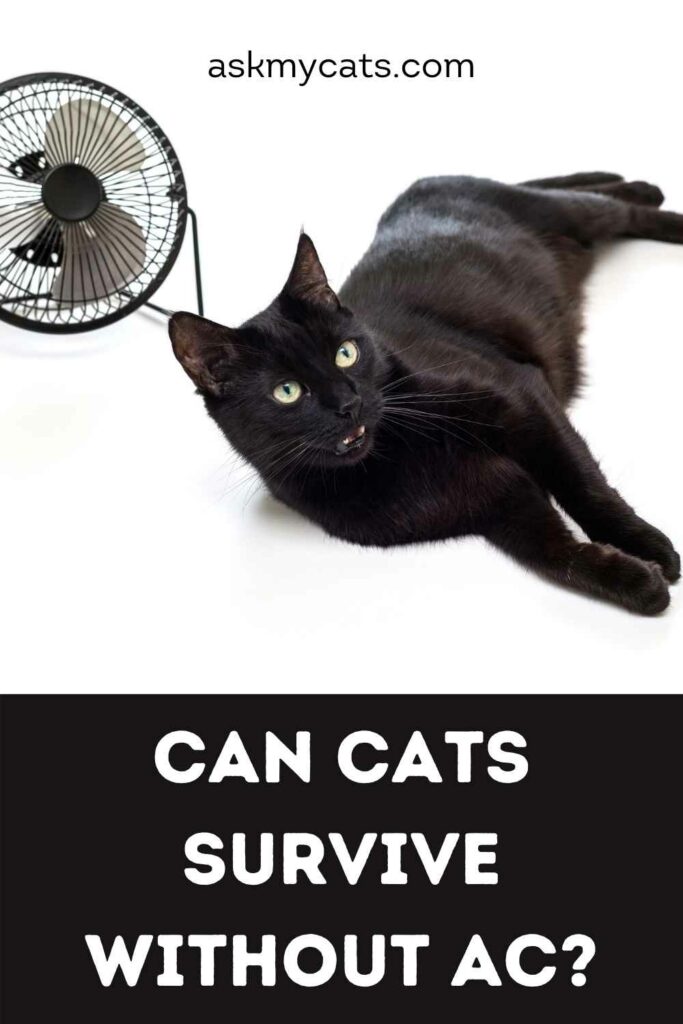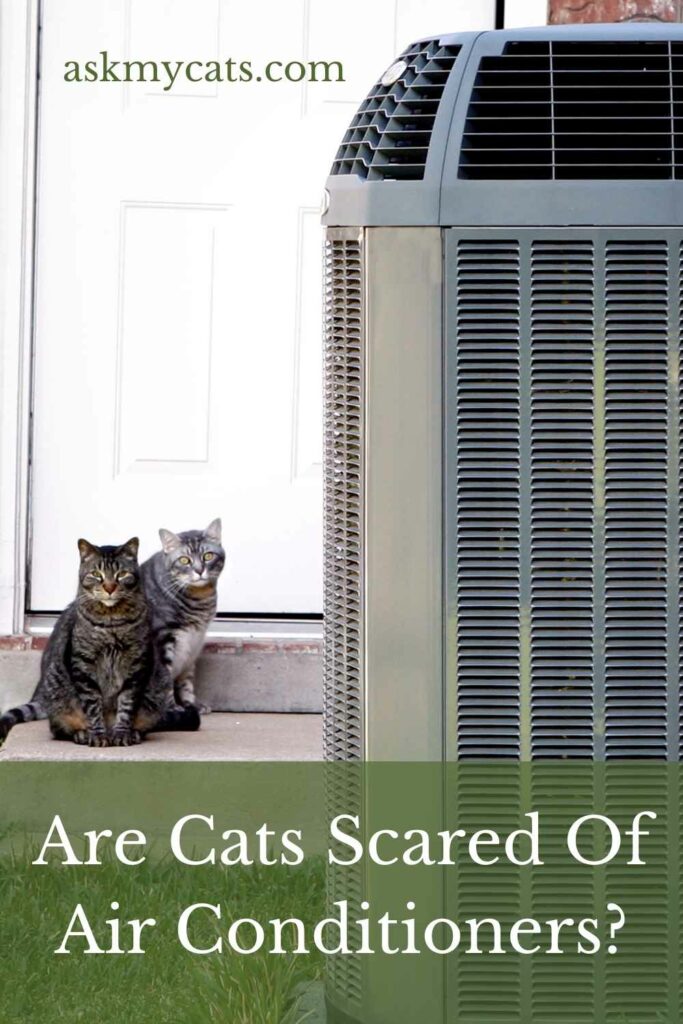We all know how much our cats enjoy sitting on sunny windowsills and snuggling up by a crackling fireplace. Felines are said to be warm-blooded creatures, frequently observed stretching out to soak their bellies in sunlight.
In this manner, they resemble cold-blooded reptile species that rely on the warmth of the sun for their energy source during the day.
Cats enjoy air conditioning because it keeps them cool and comfortable. Air conditioners offer no harm to your cat’s health and instead keep your cat from overheating.
So, without wasting any more time, let’s know in detail how an air conditioner can please your feline friend!


Give Your Cat the Perfect Day
Get the Free Ebook!
Does Air Conditioning Bother Cats?
Cats do not seem to be bothered as such by air conditioners. But cats will absolutely hate them if the air from the air conditioner is directly flowing on their body.
Cats, like humans, have developed alongside humans over the last 10,000 years or more and are tolerant of both extremes of temperature. This isn’t to say that temperature has no effect on them.
If we’re chilly, they’re likely to be cold as well. If we’re hot, they’re probably hot as well. Cats, unlike reptiles, can generate their own body heat, making them warm-blooded animals. However, a cat’s capacity to stay warm or cold is influenced by a variety of variables.
For one thing, they generate very little body heat due to their efficient muscular motions. Dogs, on the other hand, generate a lot of body heat and may require the air conditioner to remain on all day.
Even while cats like sunbathing in sunny locations and hot weather, it can become too much for them to bear. As a result, many pet owners are torn between whether or not to keep the air conditioning on for their pets.
Although cats can endure very high temperatures, extended exposure to extreme temps is not recommended for your cat.
As a result, air conditioning might be a great way to keep your cat cool. Continue reading to discover all you need to know about air conditioning and your cat, regardless of whether your cat has long or no fur.
When a blast of wind strikes your cats, it is one of their favorite things to do. The gusts can come from the outside window, a fan, my breath, or even our running air conditioner.
Your cat will not be harmed by a blast of air from your air conditioner, although it may annoy them. You may even observe your cat stooping down on the ground to avoid the blast of air.
The easiest method to keep your air conditioner from blowing straight on you and your cat is to aim the air vents toward the ceiling, which will enable it to bounce down into the room without feeling like a breeze.
You might like to check out how to keep cats cool in summer without ac
Is Air Conditioning Bad For Cats?
Air conditioning is not bad but in fact very much beneficial to cats because it keeps them cool and comfortable in their environment.
Some people believe that air conditioning may make pets sick, whether they are cats or dogs. I’m not sure where this notion came from, but if your air conditioner’s filters are clean, it’s highly unlikely that it would make your pet sick.
Air conditioning, on the other hand, is really excellent for cats since it decreases the danger of your cat overheating in the summer. Furthermore, your air conditioner will maintain the majority of your house at a pleasant, uniform temperature.
Even if your cat becomes overheated, it may walk away from the air conditioner unit.
Do Cats Need Air Conditioning?
Cats actually don’t need air conditioning so badly because they do not sweat as much as humans do. This means they have a different ability to control body temperature than we do.

Cats only sweat via their paws, so brushing, panting, stretching, and expelling excess body heat through their ears are all good ways to cool off.
Leaving a cat in a tight place with no access to fresh air can be highly hazardous. This is especially true if the area is heated and the cat is unable to keep cool.
Cars, greenhouses, sheds, tiny rooms, and other similar structures fall within this category. If there is little air movement and a lot of sun, the result will be disastrous in a shockingly short length of time.
A cat can pass out from heat exhaustion in as little as 10 minutes. When you add humidity to the mix, it gets much worse.
Despite the fact that cats enjoy being in the sun and being warm in general, and have a reputation for being desert animals, allowing them to be hot is not always safe. If cats are left in an unsafely heated setting, they might suffer from heat stroke and possibly die.
It’s far simpler for a cat to warm up when they’re cold than it is to cool down when they’re hot. If the air conditioner is on, a cat can always find a sunny area to warm up or snuggle up with a nice blanket.
When the entire house is hot, it’s much more difficult to find a cold area.
You might also like to read about do cats like fans
Can Cats Survive Without AC?
Cats don’t need air conditioning to survive.

For our feline companions, air conditioning can be too much at times. They are most comfortable when we are most comfortable, and we seldom keep our air conditioner on at an excessively low temperature.
However, because cats are considerably smaller than humans and their temperature regulation differs from ours, we should bear in mind that they may like something somewhat different than we do.
Cats can usually withstand greater temperatures than humans. Because of their capacity to preserve energy, this makes logical.
Cats understand how to maintain a low core body temperature. They will be less active in the warm afternoons, conserving their energy for the colder mornings and evenings.
On some of the hottest days of the year, you might wonder how people (and their pets) manage without air conditioning. People can survive without air conditioning; however, it is not a pleasant experience. Their pets, too, can do it.
In the heat, a home without air conditioning might be dangerous to a cat. In a hot environment, cats can suffer from heat exhaustion and dehydration, which is similar to what might happen to a cat if they spend too much time outside in the sun.
If you don’t have air conditioning, it’s critical to remember to provide cold water for your cat.
Must Read: 5 Simple Ways to Keep Your Indoor Cat Cool During Summer
Are Cats Scared Of Air Conditioners?
Air conditioners may be frightening to some cats, especially if they are noisy.

Owners frequently discover their cats stretched out on the kitchen, bathroom, laundry room, or garage floor on hot days. Cats may sometimes disappear for hours, only to reappearance under the bed or in a closet.
These are great cool spots for them to take a snooze till the sun sets. Make sure your cats have access to cooler areas of the home so they may cool off naturally.
Apart from that, cats will groom to accomplish the same effect that we do when we sweat. When saliva evaporates from their fur, it cools them off; similar to how we can feel chilly after a workout because of our perspiration.
When a breeze hits a cat, it is common for cats to try to “duck” under the air and crash to the ground. This amusing habit, however, does not necessarily imply that your cat is scared of whatever is blowing in the air.
It’s possible that your air conditioner is different. When air conditioners turn on and off, especially large or older ones, they may be rather noisy.
If your cat isn’t used to the noise, it could be startled. Air conditioners may also gurgle, and your cat might not enjoy it if they’ve never heard anything like it before.
Can Cats Get Sick From Air Conditioning?
Air conditioners may only make your pet sick if you don’t utilize the proper settings; otherwise, they are completely safe and beneficial to cats!
If you leave your dogs at home with the air conditioner turned on, there are no hazards. With the newest technology in town, such as smart thermostats or smart AC controllers, you can assure the comfort of your pets.
Smart temperature gadgets allow you to effortlessly manage and monitor the temperature of your house from anywhere. This would allow you to keep your home at a comfortable temperature for your dogs while you are gone.
Unfortunately, there is no such thing as a magic number for an AC setting that will keep your cat or dog at the perfect temperature.
Yes, your pet can become ill if your air conditioning is set too chilly for them. However, if it is really hot outside and you do not switch on the air conditioner, your pet may become ill.
Do Kittens Get Cold In Air Conditioning?
Kittens are more susceptible to catching a cold than adult cats. It’s critical to keep your kitten warm if you have one at home.
If your cat is in good health, you shouldn’t have to worry about them being cold indoors. They will be more than comfortable at the aforementioned temperature. If your furry buddy is smaller, leaner, or a kitten, you may want to raise the temperature slightly.
Many cat owners are unsure of whether the temperature is too low for their feline companion. If you’re going to be gone for a while and want to pre-set your thermostat to a more energy-efficient setting, we recommend no lower than 60 degrees.
Don’t forget to provide a comfortable, warm bed for your cat to snuggle up in. If you have blinds, keep them open so your cat may enjoy some sun if he or she wants to.
Why Does My Cat Sniff The Air Conditioning Vent?
It’s possible that your air conditioner’s vent has an unpleasant odor, causing your cat to sniff it.
This, however, might be a sign of something more serious. As a result, you should turn off your air conditioner and contact a professional to assess the situation.
If a mouse gets inside the air ducts of your air conditioner, it might die and start decaying there. And this may cause an unpleasant odor to emanate from your air conditioner’s vent, similar to that of a rotten egg.
The stench is unpleasant, and your cat may sniff it. Despite the fact that this isn’t a dangerous situation, you may need to hire a professional to remove the rotting animal.
Your air conditioner smells like rotten eggs when there’s a gas leak. Despite the fact that natural gas has no odor, your device may emit one to alert you to leakage.
If the stench is coming from the AC vent, there might be gas leaks near the air ducts. When this happens, don’t take it lightly; open the windows, exit the home, and call your gas company first, then a professional to address the situation.
Frequently Asked Questions
Do cats need ac in summer?
In the summer, cats may require air conditioning, just as they do in the winter. You might be concerned about your cat’s reaction to air conditioning. Furthermore, your pet may have an effect on your air conditioning equipment.
Do cats like cold air?
Cats are well-adapted to cold weather, but they are susceptible to hypothermia and frostbite when the temperature drops below freezing. Cats will seek out a warm area to burrow down during periods of cold weather. Building an outdoor cat shelter may be a low-cost and enjoyable family activity.
Do I Need To Leave The AC On For My Cat?
Leaving the air conditioning on for your cat will make him feel more comfortable, but it is not necessary. Leaving your air conditioner on when you leave will keep your cat cool and comfy, but this isn’t required if you just use it when you’re at home.
Final Words
It’s vital to keep in mind that our dogs are usually at ease when we are. Keeping your living area at a consistent temperature of 65-80 degrees Fahrenheit helps keep your cat pleased.
We can’t ask our cats whether they like the air conditioning on or off, but we can use our common sense and intimate knowledge of their behavior to figure out what’s best for them. It’s also crucial to remember that it’s simpler to get heated than it is to stay cold.
Clear your queries simply by leaving them in the comments section below!

One way to address this is to use a humidifier in the room where your cat spends the most time. This can help to add moisture to the air and reduce the risk of dry skin and other respiratory problems
Thank you for your suggestion! I really appreciate your concern for my cat’s well-being. I’ve actually been using a humidifier in the room where my cat spends most of her time, and it has made a noticeable difference. Her skin seems less dry, and she seems to be breathing more comfortably as well.
It’s great to have this simple solution to combat the dry air, especially during the winter months when the air tends to be drier. My furry friend deserves all the comfort and care I can provide, so I’m glad I could find a way to help alleviate any potential respiratory problems.
Once again, thank you for your advice. It’s wonderful to see how small changes like using a humidifier can have a positive impact on our beloved pets’ health and happiness.